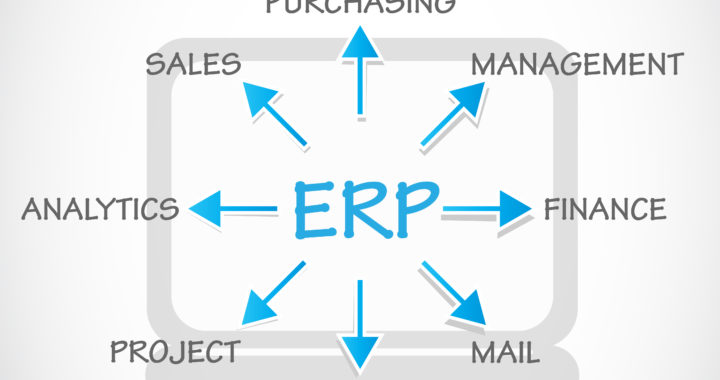Starting a business is hard. There are so many things to keep track of and you will likely find yourself turning to software solutions to lighten the load. When you start looking for software to solve various problems, remember that working smarter is better than working harder. Toward that end, you should definitely consider implementing an ERP (Enterprise Resource Planning) solution.
What is ERP? ERP is business process management software that allows an organization to use a system of integrated applications to manage the business and automate many back office functions related to technology, services and human resources.
Maybe your business is relatively small and implementing ERP seems like overkill. It may feel that way but I can promise it is definitely not. Here are seven ways an ERP can benefit your business from the beginning.
Save Money
Training and implementation can be time consuming and expensive but you can save money by only having to train on and implement one software rather than multiple. An ERP unifies many of the systems that may currently be fragmented in your organization, saving you money since you have to pay for one instead of many softwares. By unifying systems, you help your staff utilize their time more efficiently, also saving money. An ERP also reduces errors brought on by working with the incorrect or redundant data, further lowering costs.
Manage Business Relationships
Enterprise resource planning can also help you manage relationships across the business including customers, vendors, and employees.
With an ERP, your CRM (customer relationship management) has access to data across business functions. Along with contact information, an integrated CRM can show you details such as order history and billing information. This enables your team to see your clients more holistically and to gain a better understanding of their wants and needs. The increased customer visibility helps you formulate your sales strategy for improved lead generation. Vendor management is not much different. You will be able to see not only the company details but view the history of and report on transactions that occurred. Employee ERP tools can include payroll and HR Document retention as well as controlling system access levels, ensuring staff see only what is relevant to their position.
Manage Inventory
A major challenge for growing companies is tracking and monitoring their expanding inventory levels. An ERP can utilize barcoding, RFID tags and serial numbers to keep tabs on your inventory at every stage during the supply chain. These tools help you keep track of inventory levels, which items are in transportation and which items are on the shelves ready for consumers. The increased visibility optimizes the pick, pack and ship process greatly, removing all the guesswork. Inventory monitoring also bolsters reporting, as tracking technologies provide more accurate numbers. With the greater precision provided by ERP, you can get real-time data on your inventory to make more accurate business decisions.
Manage Production Planning and Resource Management
Along with managing your inventory, ERP also manages manufacturing. Enterprise resource planning provides insight into all manufacturing operations including the shop floor. This enables users to optimize production schedules, equipment and labor to maximize capacity.
Streamline Processes
From product development to accounts payable, your staff will be able to access all the necessary tools for their job from one centralized system. An ERP can automate some of your most tedious tasks including financials tracking, inventory control, and project planning.
Analytics and Reporting
Since an ERP records and stores all the data users input, it makes for an excellent business intelligence tool. Enterprise resource planning software makes it easier and faster for your team to generate reports. Reports that could take days of research and compilation without an ERP takes just minutes. Easy access to these reports enables you and your team to make better decisions more quickly.
Compliance and Risk Management
it can be difficult to keep track of all the different regulations imposed on your business. Many ERP offerings are built with these regulations in mind to help you maintain compliance at every stage. Moreover, ERP software provides built-in auditing tools to assist with documenting things like chemical use and tax provisions. This makes it incredibly easy to formulate reports and send them over to the relevant governing body.
Also, ERP often provides tools to manage risk. Enhanced reliability and accuracy improve overall financial management since there’s less chance for errors during accounting. Reporting tools also allow users to predict events when it comes to demand, labor and budget. With this information in hand, you can create more secure budgets, schedules and product development plans.
Start Early
Even a small business can create lots of data that needs tracking. That is why It is always easier to implement ERP in the beginning rather than migrate large amounts of data later when it becomes more than a necessity.
Adilas
With a robust and comprehensive suite of tools, Adilas is a full ERP solution that allows you to manage all parts of your business from one easy to use software. It is an inventory control and accounting software trusted in dozens of industries around the world, for nearly 2 decades. Adilas offers software as a service (SaaS) for any company at any size. It is a one-stop solution to all your data needs. Affordable, powerful, and customizable, dynamic software that allows data to be tracked, connected, accessed, and searched on the cloud. It is one of the most powerful dynamic systems at an affordable price for any company. Customization allows adaptation to any corporation’s workflow.
Let us help!
We are experts in Adilas and would love to show you what it is all about. Contact us today to schedule a free demo and to discuss your enterprise resource planning needs.

